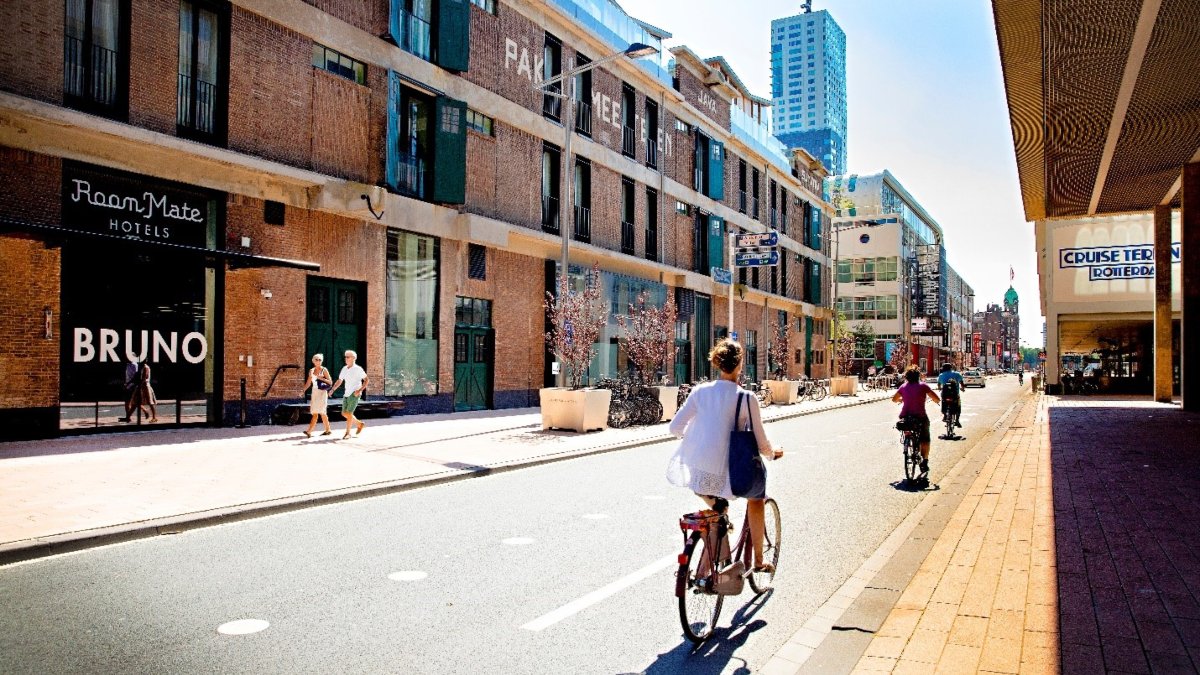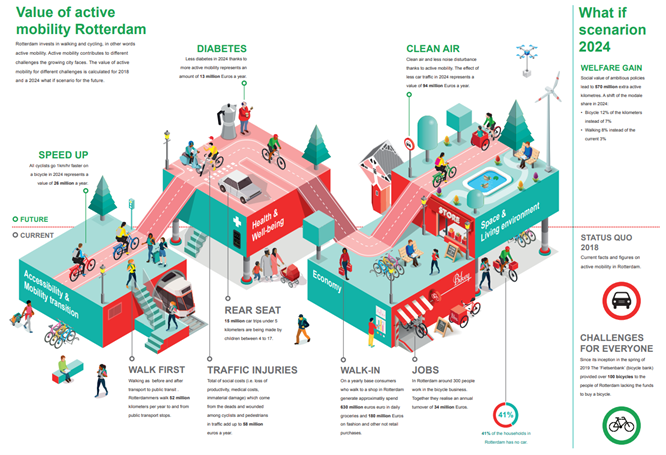
Rotterdam: A city where cycling and walking is only logical
ECF welcomes the City of Rotterdam to Cities & Regions for Cyclists (CRC), the network bringing together local and regional administrations actively working to promote cycling as a mode of transport and leisure.
Rotterdam is not a typical Dutch cycling city due to its car-oriented design. However, a transition has been underway since the early 2000s and Rotterdam is already ranked number seven in the PeopleForBikes City Ratings, a result of the evolving quality and connectivity of the City’s bicycle network.
Rotterdam has seen a staggering 45% increase in the number of cyclists between 2010 and 2020, as counted on main cycle routes, bringing the city’s modal split on par with the national average of 28%. The new objective is to accommodate the growing number of cyclists, which can potentially increase to 32% in 2030 and 34% in 2040.
But becoming a cycling city is not the overarching goal for Rotterdam. Instead, the key ambition is to build a city with great public spaces where walking and cycling is only logical. To this end, cycling development is employed not as an end in itself but to contribute to ongoing efforts on circularity and a healthy, compact, productive and inclusive city. In the coming ten years, €233 million will be invested in green and attractive city projects that put people first in terms of design.
New challenges
Rotterdam’s upcoming challenge will be the growing diversity on its cycle lanes in terms of the speed, width and weight of bicycles, as well as cyclists of all ages and abilities. To accommodate all needs, Rotterdam will make space for different types of cyclists.
“Mobility in Rotterdam is transforming,” said Bart Christiaens, Cycling Manager for City of Rotterdam. “The number of cyclists in the city is growing and, as a municipality, we must facilitate this transition by improving the infrastructure for cyclists so all can move around quickly, comfortably and safely. For the future it means Rotterdam will become a healthier, safer and more active, inclusive and efficient city.”
Potential benefits
Rotterdam has calculated the value of active mobility for a 2024 “what-if” scenario, supposing that an extra 570 million active kilometres will be walked or cycled by Rotterdammers by then. In this scenario, increased investments in active mobility would result in reduced diabetes and healthcare costs, cleaner air and less noise pollution. In addition, it is calculated that if cyclists in Rotterdam could travel 1 km/hr faster, the city would also gain €26 million per year.

Infographic by DECISIO and City of Rotterdam
Based on a recent reachability study, extra regional cycle highways will be built as part of a regional network. Since 2022, Rotterdam has a new “coherent” cycle network which consists of four-levels – regional, urban, fine-grained neighbourhood and recreational. Meanwhile, Rotterdam has welcomed several cycling-related achievements so far, of which notable highlights include the readaptation of the main city street, new bike parking facilities, an adaptive strategy on shared mopeds and bicycles and the bicycle parklet.
In the last two years Rotterdam has created 6,500 new parking spaces for bikes and in the upcoming years, five to seven new bike parking garages will be realised. Besides investments in infrastructure and bicycle parking, the city is also conducting cycling stimulation projects, with programs for cycling classes at schools and in neighbourhoods.
A new approach to mobility
As part of the Vision on Cycling Fietskoers 2025 (2019, in Dutch), “Fietsalliantie”, The Rotterdam Bicycle Alliance, has been established. A partnership of employers and organisations, it promotes bicycles among staff and supporters. The aim is to join forces together and stimulate cycling through organised campaigns and the exchange of experience.
Now, more than 50 organisations are working together to improve the cycling culture in Rotterdam. The partners have teamed up to organise the city’s very first cycling festival Rotterdam Rides this spring. To reach a broader target, the “Zuid-Holland accessible” is also a partner of the alliance and supports employers and organisations providing “bicycle potential” scans, e-bike trial offers and a discount offer for two-wheelers.
“Fietskoers 2025” and the Rotterdam Bicycle Alliance both represent the outcome of the new Rotterdam Mobility Approach (RMA) (in Dutch), the city’s sustainable mobility plan aiming to give more space to active mobility.
“The focus is different: in addition to the hard infrastructure and the numerical models, the softer side of behavioural change now also plays a role in mobility influence,” said Christiaens. “Understanding the Rotterdammer and the visitor, how they want to travel. When you understand this behaviour and include it in your decisions and monitor it, it leads to more effective decisions and ultimately to a mobility transition.”
ECF and the city of Rotterdam are already collaborating in various initiatives, for example giving expert input to a planned green paper on walking and cycling data led by Ramboll consulting.
For more information on ECF’s CRC network and how to join, visit our Cities & Regions for Cyclists page.
Regions:
Network/Project Involved:
Contact the author
Recent news!
Upcoming events
Contact Us
Avenue des Arts, 7-8
Postal address: Rue de la Charité, 22
1210 Brussels, Belgium









